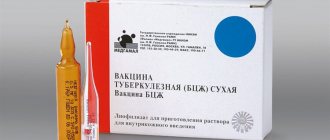Indications for vaccination
Vaccination is recommended for adult patients:
- for pathologies of internal organs of a chronic nature in the stage of decompensation and subcompensation;
- for acute leukemia and other malignant formations;
- with long-term treatment with immunosuppressants that reduce the body's protective functions;
- during a course of radiation therapy;
- before organ transplantation.
Immunization of children occurs at the age of one year. There is no point in doing this in an earlier period. If the mother had chickenpox before pregnancy, the antibodies will enter the baby's body along with the milk.
Children are vaccinated only if they have not had chickenpox. Vaccination is required when registering for kindergarten or camp. By getting vaccinated in infancy, the child is protected from the disease itself and its complications.
Vaccination is indicated when planning pregnancy (at least three months before fertilization). If infection with a pathogen occurs during pregnancy, this can lead to serious complications: miscarriage, infection of the embryo, problems with intrauterine development.
Is it possible to get chickenpox after vaccination?
Varicella vaccines have been widely used for just over 20 years. Studies have shown that immunity against the disease persists throughout this period. In addition, the first people to receive a dose of chickenpox vaccine were during clinical trials of vaccines more than 40 years ago, and the study showed that they had immune protection against this viral infection. Therefore, people vaccinated against chickenpox never get sick in 99% of cases.
In extremely rare cases, a vaccinated person may develop chickenpox; this can occur against the background of immunodeficiency conditions, for example, with oncological pathologies, with long-term use of systemic glucocorticoids, immunosuppressants, after radiation or chemotherapy, etc. But the disease will be mild without the development of complications .
Are there any contraindications
Categorical contraindications:
- acute infectious lesions;
- relapse of chronic pathologies;
- mild intestinal and respiratory infections (done a month after the clinical picture disappears);
- meningitis and other pathologies of nervous tissue (performed 6 months after treatment);
- AIDS;
- oncological diseases;
- treatment with corticosteroids;
- preparation for surgery, postoperative period;
- intolerance to vaccine components;
- use of immunoglobulins and blood products 6 months before vaccination.
Relative restrictions in use:
- chronic pathologies of the cardiovascular system, liver, kidneys;
- high likelihood of seizures;
- weak immunity;
- allergic reaction to other vaccines.
In such pathological conditions, immunization is possible, but requires permission and supervision from a doctor.
Why is vaccination necessary?
Vaccination is performed to produce antibodies to the third type of herpes virus, which causes the disease. Thanks to this, the human body will be able to resist pathogens even when in contact with an infected person.
The vaccine is not included in the national vaccination schedule. Therefore it is not free. However, it is recommended for everyone to do it. The positive result that a person receives from it pays for the cost. Vaccination is recommended for employees of kindergartens and schools. Chickenpox outbreaks are more likely to occur in these facilities.
Types of vaccines
In the Russian Federation, vaccination with two types of drugs against smallpox is allowed: Okavax, Varilrix. Medicines are produced abroad and are expensive. Immunization is carried out at the request of guardians or parents in specialized licensed clinics.
The composition of the drugs includes herpes virus type 3. However, it is so weak that it is not able to provoke an outbreak of infection. The immune system responds to the penetration of pathogens and produces antibodies to them. The body is able to resist the virus, even many years after vaccination.
Okavax is produced by Sanofi Pasteur from France, and Varilrix is produced by GlaxoSmithKline Biologicals from Belgium. The effectiveness of both vaccines is approximately the same. They differ in the chickenpox vaccination schedule. The doctor selects the medication based on the availability of the drug and the patient’s convenience.
Chickenpox vaccination
In Russia, the chickenpox vaccine appeared relatively recently, in 2008. But still not all parents are in a hurry to vaccinate their children. The main thing that gets in the way is doubt about its necessity. A compelling argument: everyone got sick in childhood - and it’s no big deal. Is this really the case with Marina Galitskaya, Candidate of Medical Sciences, pediatric immunologist, head of the department of vaccine prevention at the Children's Health Research Center of the Russian Academy of Medical Sciences.
Chickenpox, or chickenpox, is a very contagious disease that develops when you first encounter a virus called Varicella zoster. In most cases, this happens in kindergarten, and lifelong immunity is formed. But not everything is so simple, and the story does not end there, as many people think.
Firstly , the Varicella zoster virus permanently settles in the nerve endings and, under suitable conditions, can “come to life” again and cause a relapse, now in the form of herpes zoster, with a profuse rash along the nerves and severe pain that is not relieved by conventional analgesics.
The probability of developing such relapses is about 15% and increases sharply after 40 years. A person with herpes zoster can also infect others with chickenpox. But if you have not had it, this disease does not threaten you.
Secondly , even in children 3–7 years old, at an age when chickenpox is usually mild, severe variants of the disease occur. The temperature rises to 38–39ºС and lasts for several days. The baby develops stomatitis, ulcers appear on the mucous membranes of the eyes and genitals.
Thirdly , the disease is far from harmless for the elderly and children in their first year of life. Very often dangerous complications develop: pneumonia, chickenpox encephalitis, damage to the mucous membrane of internal organs, etc.
So the desire of some mothers to bring their baby to visit friends with chickenpox (“Let him get over it in childhood”) is, at the very least, irrational and even dangerous. There is nothing useful about chicken pox! Only one “type” of meeting the virus is justified – in the form of a vaccinated vaccine.
Current issues
Can I be sure that after vaccination I will not get chickenpox?
There is still a chance, although very small (less than 1%), of becoming infected through contact with a sick person. It depends on the characteristics of the immune system. But the disease will pass in a mild form: fewer rashes, no fever, quick recovery, without complications. And you certainly don’t have to wait for herpes zoster as a “retirement gift.” More often, cases of chickenpox occur in those who have been vaccinated once, so in some countries, to be completely sure, vaccination is repeated after 10–12 years.
Is it possible to get sick directly from vaccination? After all, the virus in the vaccine, although weakened, is still alive?
Within 30 days after vaccination, one in 20 people develops several elements of the rash, but this is a mild form of chickenpox that occurs without complications. However, in this case, the vaccinated person becomes infectious to others.
It is better, just in case, after getting vaccinated, to avoid contact with pregnant women for 3 weeks, since they are especially sensitive to the virus (in the first trimester of pregnancy) and with people at risk for severe chickenpox (patients with leukemia or receiving treatment with immunosuppressants).
It is possible to get vaccinated while breastfeeding, although it is not advisable, again due to the risk of developing vaccine-induced chickenpox and the possibility of infecting the baby.
What side effects might there be?
The statistics of troubles inherent in general with any vaccinations are as follows: one in 5 children and one in 3 adolescents and adults have pain at the injection site. One in 10 people develops a fever. One out of 1000 vaccinated people may have seizures due to fever, which is generally possible at any temperature and for a completely different reason. One in 20 people develops several elements of the rash, that is, mild chickenpox. Severe complications like pneumonia can only happen if the vaccine was given against the background of a serious immunodeficiency - their probability is one in 100 thousand vaccinated people.
How does the vaccine compare with other vaccines?
Chickenpox and other live vaccines are given at monthly intervals. On the same day, you can be vaccinated with chickenpox and any other inactivated vaccine with the exception of rabies (against rabies). If you didn’t do them at the same time, it’s better to wait a month.
Whether to vaccinate or not is a personal decision for everyone. In the USA, Israel, Germany and other countries, mass vaccination against chickenpox has been carried out for decades. In Russia, the chickenpox vaccine is not included in the National Vaccination Calendar.
How can I check whether I need vaccination if there is no information about infections suffered in childhood?
An encounter with a virus can go unnoticed. Sometimes parents don't even know that their child has had chickenpox. But such cases are rare. You can check whether you are infected with the virus or not by taking a blood test from a vein for antibodies to Varicella zoster.
You can't get vaccinated if...
- at least once there was a pronounced allergic reaction to the components of the vaccine - gelatin, the antibiotic neomycin;
- the person being vaccinated is unwell, a chronic disease has worsened (especially when accompanied by fever) - the procedure is postponed until recovery;
- there is a pregnancy, and after vaccination it is advisable not to become pregnant, according to various sources, for another 1–3 months;
- A blood transfusion was given within 3 months before vaccination.
Vaccination scheme
From 12 months to 13 years of age, one injection is sufficient and one dose is given.
After 13 years of age, revaccination is required after 4–8 weeks.
Any age from 12 months, but urgently (if a person with chickenpox appears in your team) - one injection during the first 72, or preferably 48, hours after contact. Recently it became known that the Ministry of Health of the Russian Federation is going to add vaccinations against rotavirus infection and chickenpox to the national vaccination calendar. The expansion of the vaccination calendar is expected by 2021.
ABC Magazine
Vaccine administration method
The vaccine is administered to a healthy patient by a medical professional with special clearance. A specialist passes exams annually to obtain it. It is impossible to vaccinate yourself on an outpatient basis.
The drug must be in the refrigerator and not expired. The injection kit includes a dry substance with an active element - lyophilisate and purified water. The solution is prepared in a dark room. Exposure to ultraviolet rays is unacceptable. The drug should not be stored in already prepared form.
The injection is administered under the skin. Most often, the injection is placed in the deltoid muscle of the shoulder. This reduces the likelihood of adverse reactions. The vaccine can also be injected under the shoulder blade, in the outer part of the thigh. The medication is not used intravenously.
The patient spends half an hour in the hospital after the event. Doctors monitor the manifestations of allergic reactions and give recommendations on the regimen during the post-vaccination period.
Chickenpox vaccines
To date, only two foreign vaccines against this disease have been registered in Russia; there are no domestic drugs yet. The Japanese vaccine Okavax and the Belgian vaccine Varilrix are supplied to our country. Both drugs have almost the same effectiveness and contain weakened viruses that cause chickenpox.
Okavax vaccine
Approved for use in children over 1 year of age and adults. It is suitable not only for vaccination in order to form immune protection, but also for emergency prevention after contact with a patient. A single administration of the drug leads to the formation of post-vaccination immunity in 90% of patients, so only one injection is usually given. The vaccination kit is intended for one person only, and the entire drug is injected at once subcutaneously, usually into the upper arm. An open bottle is not stored.
Varilrix vaccine
This vaccine is also approved for use from 1 year of age and is used to create immune protection against chickenpox and prevention after contact with a sick person. The vaccine is injected into the shoulder subcutaneously; if for some reason it is not possible to inject into the deltoid muscle, then the drug is injected into the subscapular region.
The full course of vaccination consists of 2 injections of the drug, which are performed at intervals of 1.5–3 months. As a result of the administration of two doses, post-vaccination immunity is provided in 99–100% of cases.
Vaccination validity period
Immunity to herpes virus type 3 is formed 6 weeks after administration of the drug. However, vaccination cannot provide a 100% guarantee that infection with a pathogen will not occur. Vaccination reduces the likelihood of infection by 95-98% and the risk of chickenpox complications.
According to the manufacturing companies, the validity period of the drugs is 30 years. This was proven by studies conducted 20 years ago. Antigens to pathogenic microorganisms were found in vaccinated people. Therefore, vaccination is usually done 1-2 times throughout a lifetime.
Compatibility with other vaccines
The Varilrix vaccine can be administered simultaneously with all drugs from the national schedule of preventive vaccinations on the same day, in different parts of the body, with the exception of the BCG vaccine and rabies vaccine. The use of the Varilrix vaccine together with other vaccinations does not affect their immunogenicity (ability to develop immunity). Tolerability of vaccines does not deteriorate, and the number of adverse reactions does not increase. Administering several vaccines on the same day does not place an excessive burden on the immune system.
Varilrix should not be given concomitantly with other live attenuated vaccines, with the exception of the combined measles, rubella and mumps vaccine. However, if these vaccines were not prescribed at the same time, then the interval between their administration to achieve maximum antibody levels should be at least 30 days.
Administration of the Varilrix vaccine is possible no earlier than 3 months after the administration of immunoglobulins or after a blood transfusion (blood transfusion).
If it is necessary to perform a tuberculin test (Mantoux), it should be performed before vaccination, since according to available data, live viral vaccines can cause a temporary decrease in skin sensitivity to tuberculin. Due to the fact that such a decrease in sensitivity can persist for up to 6 weeks, tuberculin testing should not be performed within the specified period of time after vaccination to avoid obtaining false negative results.
Adverse reactions
From the second to the third week after vaccination, delayed general reactions may appear; there is no need for special treatment, they go away on their own:
- slight increase in temperature;
- general malaise;
- rare rashes resembling chickenpox, accompanied by itching;
- enlarged lymph nodes.
Side effects:
- herpes zoster;
- brain inflammation;
- deterioration of sensitivity;
- decreased platelet levels;
- pain in large joints.
According to WHO, such manifestations occur in fifteen out of one million people. If you experience unfavorable symptoms, you should consult a doctor for help.









